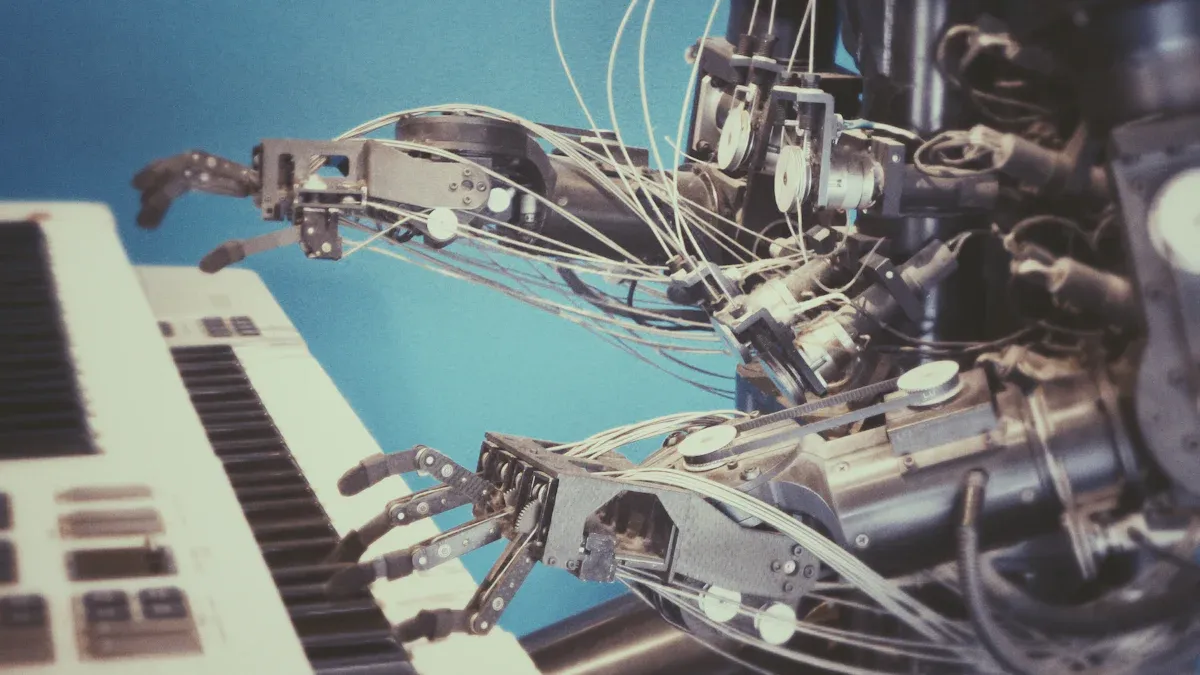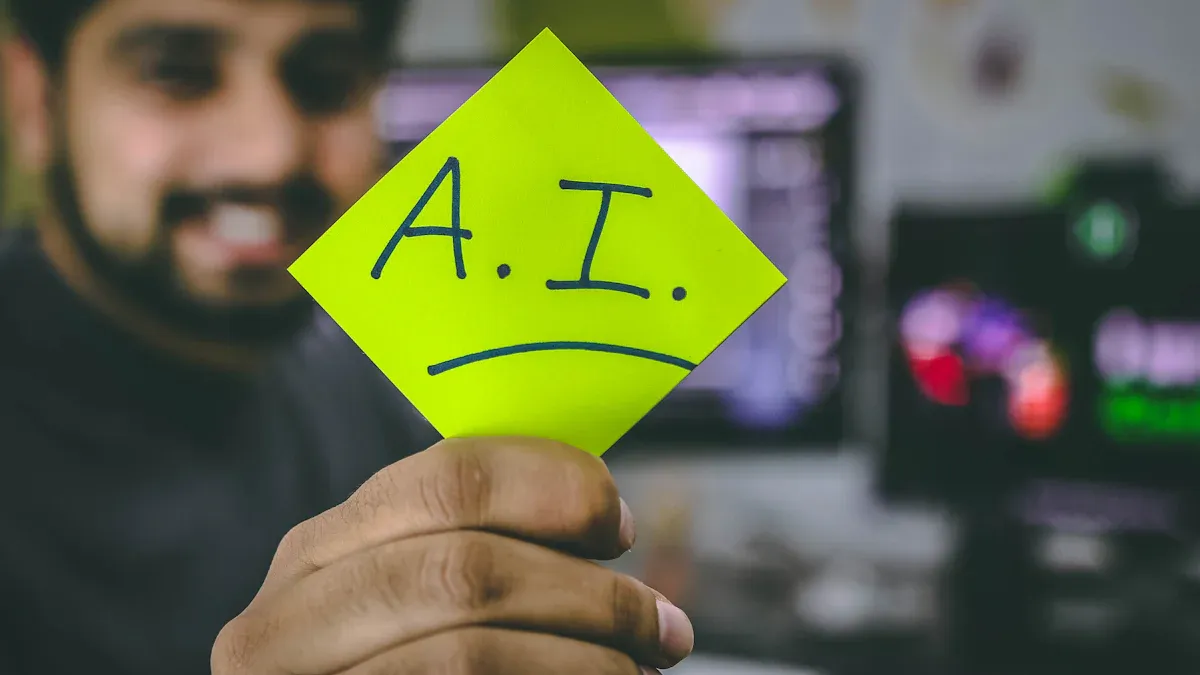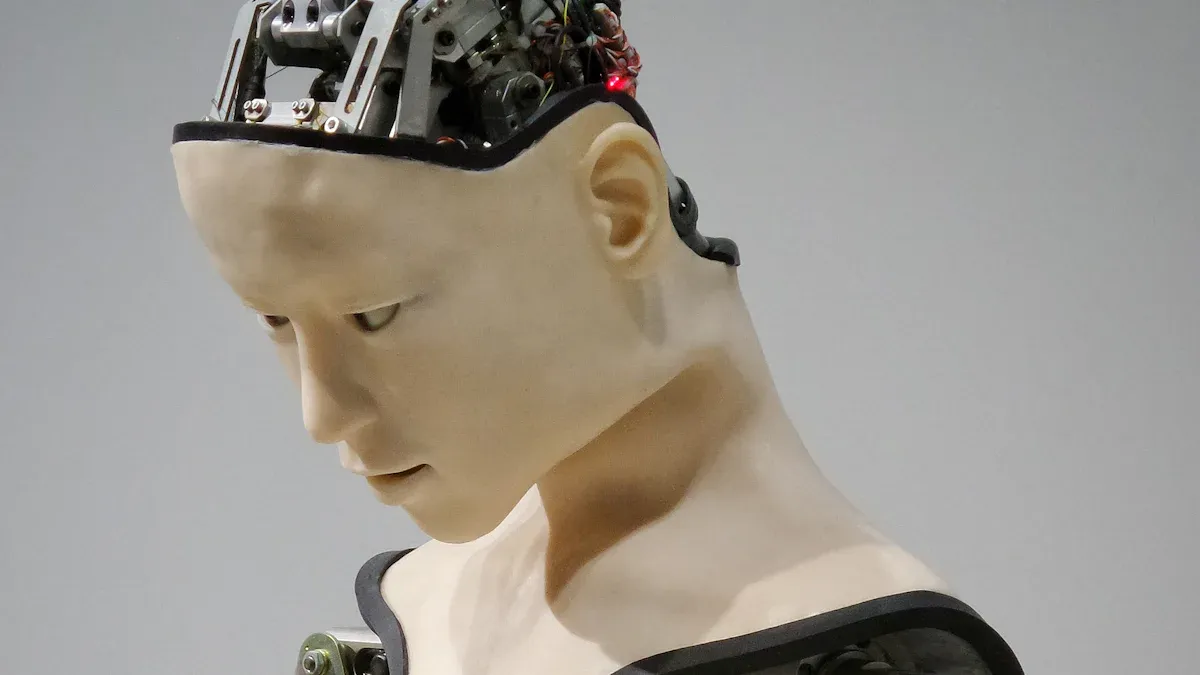Why AI Interview Scheduling Matters for Hiring Success

AI interview scheduling transforms how you manage recruitment. It eliminates the hassle of juggling calendars and reduces the risk of scheduling conflicts. By automating repetitive tasks, it saves time and ensures a smoother process for both you and your candidates. For example, Sobeys, a Canadian grocery chain, tackled no-show issues by using an AI assistant that sent reminders and allowed easy rescheduling. This approach significantly improved candidate engagement and reduced dropouts. When you adopt AI for recruitment, you create a seamless experience that keeps candidates interested and your hiring process efficient.
Key Takeaways
AI interview scheduling helps save time by handling simple tasks. This lets recruiters work on more important things.
Automated reminders and easy scheduling make candidates happier and lower no-shows.
AI tools make hiring faster by setting up interviews quickly and keeping a good list of candidates.
Using AI in hiring makes the process fairer and less biased, helping create a more welcoming workplace.
Using AI scheduling shows your company is modern and smart, which helps attract the best workers in a tough job market.
The Benefits of AI Interview Scheduling

Saving Time for Recruiters
Automating repetitive scheduling tasks
Recruiters often spend hours juggling calendars and coordinating interview slots. With AI and automation, you can eliminate these repetitive tasks. AI-powered recruitment software scans availability across calendars and automatically schedules interviews, freeing up your time for more strategic activities. For instance, companies like Google have reported a 20% reduction in time-to-hire by leveraging AI interviews. This efficiency not only enhances the recruitment process but also ensures you focus on screening candidates and delivering the best candidate matches.
Reducing back-and-forth communication
Manual scheduling often involves endless emails and calls to finalize interview slots. AI-assisted interviews streamline this process by automating communication. Chatbots, a key feature of recruitment software, interact with candidates 24/7, providing instant responses and scheduling options. This reduces delays and ensures interviews are set up quickly. According to research, automated scheduling can cut the time to interview from 10 days to just 2 days—an 82% improvement. By adopting AI, you save time and improve the overall recruitment process.
Enhancing Candidate Experience
Providing faster responses and confirmations
Candidates value prompt communication during the hiring process. AI interviews ensure they receive immediate responses and confirmations, enhancing their experience. For example, McDonald’s franchises reported nearly unanimous approval ratings for their AI scheduling system, which allowed candidates to schedule interviews in minutes. This speed not only improves satisfaction but also reduces the risk of losing top talent to competitors.
Offering personalized scheduling options
AI and automation allow you to offer flexible scheduling options tailored to candidates' preferences. Recruitment software matches their availability with yours, ensuring convenience for both parties. This personalization enhances the recruitment process and leaves a positive impression on candidates. L'Oréal, for instance, achieved higher satisfaction scores by using AI to provide timely and flexible scheduling options.
Increasing Recruitment Efficiency
Reducing scheduling delays
AI interviews eliminate common scheduling bottlenecks. By automating the process, you can reduce delays and ensure interviews happen on time. This efficiency keeps your hiring timeline on track and prevents disruptions in the recruitment process. Companies like L'Oréal have seen a 33% reduction in time-to-hire by integrating AI into their recruitment technology.
Maintaining a robust candidate pipeline
AI-assisted interviews help you maintain a steady flow of higher-quality candidates. Automated reminders and follow-ups reduce no-shows, ensuring your pipeline remains strong. Additionally, AI delivers the best candidate matches by analyzing data and identifying top talent. This approach enhances recruitment efficiency and ensures you consistently attract top-tier candidates.
How AI Improves Interview Scheduling
Automation and Smart Scheduling
Coordinating availability across calendars
AI simplifies the complex task of coordinating schedules. It scans multiple calendars to find overlapping availability, ensuring interviews are set up without delays. This eliminates the need for manual checks and reduces errors. Many companies have seen significant improvements by adopting AI for scheduling.
A study by Lever reveals that 60% of candidates abandon applications due to tedious scheduling processes.
Organizations using automated scheduling tools report a 30% reduction in time-to-hire, which enhances the candidate experience.
By automating this process, you can focus on engaging with candidates rather than managing schedules.
Automatically resolving scheduling conflicts
AI tools excel at resolving conflicts that arise during scheduling. If a time slot becomes unavailable, the system automatically adjusts and offers alternative options. This ensures interviews proceed without interruptions. You no longer need to worry about last-minute changes or overlapping appointments. AI handles these challenges seamlessly, keeping your recruitment process on track.
Predictive Analytics for Better Outcomes
Identifying ideal interview times
AI uses predictive analytics to determine the best times for interviews. It analyzes data to identify patterns, such as when candidates are most likely to be available. This ensures interviews are scheduled at optimal times, improving attendance rates and satisfaction.
Description | |
|---|---|
No-show rates | Measures the percentage of candidates who do not attend scheduled interviews. A lower rate indicates better engagement and effectiveness of scheduling. |
Time-to-hire | The average time taken to fill a position, which can be optimized through effective scheduling. |
Candidate satisfaction | Gauges how candidates feel about the interview process, which can be improved with AI-driven scheduling. |
Anticipating no-shows or delays
AI can predict potential no-shows or delays by analyzing historical data and candidate behavior. This allows you to take proactive measures, such as sending reminders or rescheduling. By anticipating these issues, you can maintain a steady hiring process and avoid disruptions.
Reducing Bias in Scheduling
Ensuring fairness in time slot allocation
AI ensures fairness by allocating time slots without favoritism. It uses objective criteria, such as availability, to assign interview times. This eliminates the risk of unconscious bias, creating a more equitable process for all candidates.
Avoiding unconscious biases in manual scheduling
Manual scheduling often introduces biases, even unintentionally. AI eliminates this by relying on data-driven decisions. It treats all candidates equally, ensuring everyone has an equal opportunity to succeed. This fosters a more inclusive hiring process and strengthens your employer brand.
Addressing Challenges and Misconceptions About AI
Data Privacy and Security
Ensuring secure handling of sensitive information
When you use AI tools in the recruitment process, protecting sensitive candidate data becomes a top priority. AI scheduling systems are designed with robust security measures to ensure data remains confidential. Many tools comply with industry standards like SOC 2 and HIPAA, which safeguard personal and health-related information. Additionally, international data transfer restrictions prevent unauthorized sharing of data across borders. By choosing AI solutions with these certifications, you can confidently handle sensitive information without compromising security.
Using AI tools compliant with privacy regulations
Adopting AI tools that align with privacy regulations like GDPR and CCPA ensures compliance with legal requirements. These frameworks protect candidate data and provide transparency in how information is used. For example, GDPR compliance guarantees that European candidates' data is handled responsibly, while CCPA focuses on protecting California residents. By prioritizing compliance, you not only build trust with candidates but also avoid potential legal challenges.
Ethical Considerations in AI Use
Balancing AI automation with human oversight
AI enhances the recruitment process, but human oversight remains essential. Algorithms can unintentionally perpetuate bias if the underlying data is flawed. Regular audits and diverse training datasets help mitigate this risk. Strengthening oversight through corporate ethics and external reviews ensures fairness in hiring decisions. By combining automation with human judgment, you create a balanced approach that leverages AI's efficiency while maintaining ethical standards.
Maintaining transparency in AI-driven processes
Transparency is key to building trust in AI systems. Candidates should understand how AI influences scheduling decisions. Clear communication about the role of AI in the process fosters confidence and reduces skepticism. Implementing tools with transparent decision-making algorithms and providing candidates with an appeals process ensures fairness. This approach not only enhances your employer brand but also demonstrates your commitment to ethical recruitment practices.
Overcoming Resistance to AI Adoption
Educating teams on the benefits of AI
Resistance to AI often stems from misconceptions, such as the fear that it will replace human roles. In reality, AI is designed to augment your capabilities, not replace them. Comprehensive training programs can help your team understand AI's potential. Sharing success stories and highlighting how AI simplifies tasks can alleviate concerns. For example, showing how AI reduces scheduling delays and improves efficiency can shift perspectives and encourage adoption.
Providing training for seamless integration
Training is crucial for integrating AI into your recruitment process. Offering resources like online courses and workshops tailored to different learning styles equips your team with the skills they need. Creating an internal knowledge center encourages exploration and reduces intimidation. By investing in education, you empower your team to embrace AI confidently and maximize its benefits.
Why AI Interview Scheduling is the Future of Recruitment

Aligning with Modern Hiring Trends
Supporting remote and hybrid work environments
Remote and hybrid work models are no longer just trends—they are the future of work. By 2025, many industries are expected to adopt these models as the default. AI interview scheduling plays a critical role in supporting this shift. It enables you to coordinate interviews seamlessly across time zones, ensuring flexibility for both candidates and recruiters. This flexibility is essential, as 48% of employees would consider leaving their jobs if remote work options were removed.
AI tools also enhance productivity and job satisfaction by accommodating candidates' preferences. With 55% of U.S. remote-capable employees already working in hybrid arrangements as of February 2023, offering flexible scheduling options helps you attract and retain top talent. Companies that fail to adapt may struggle to compete in this evolving landscape.
Enabling global recruitment efforts
AI interview scheduling empowers you to expand your talent pool beyond geographical boundaries. It simplifies the process of coordinating interviews with candidates from different parts of the world. This capability is vital in today’s globalized job market, where top talent can come from anywhere.
By automating time zone calculations and offering multilingual support, AI ensures a smooth hiring process for international candidates. This not only saves time but also demonstrates your commitment to inclusivity and efficiency. As the AI recruitment market grows from USD 580 million in 2020 to an estimated USD 3.1 billion by 2025, leveraging these tools will position you as a forward-thinking employer.
Staying Competitive in Talent Acquisition
Attracting top talent with streamlined processes
In a competitive talent market, speed and efficiency are key. AI interview scheduling reduces friction in the hiring process, allowing you to move quickly and secure top candidates before your competitors. By automating scheduling tasks, you can focus on building relationships with candidates and assessing their fit for your organization.
Candidates appreciate a smooth and efficient interview process. When they experience fewer delays and faster responses, their perception of your company improves. This efficiency not only enhances their experience but also increases your chances of closing offers with high-quality talent.
Enhancing employer branding through technology adoption
Adopting AI interview scheduling sends a strong message about your company’s commitment to innovation. It shows that you value candidates’ time and are willing to invest in technology to improve their experience. Studies reveal that 75% of employers are already using AI tools, highlighting the growing shift toward automation in recruitment.
By integrating AI into your hiring process, you position your company as a leader in modern recruitment practices. This enhances your employer brand and makes you more attractive to top talent. Additionally, tracking key metrics like no-show rates and time-to-hire demonstrates the effectiveness of AI-driven scheduling, further solidifying your reputation as an efficient and candidate-focused employer.
AI interview scheduling transforms your hiring process into a streamlined, efficient system. It saves time, reduces administrative burdens, and enhances the candidate experience. By adopting this technology, you can confidently address challenges like data privacy and ethical concerns while staying ahead in the competitive job market.
Why AI scheduling matters for you:
Automated reminders reduce no-shows and keep interviews on track.
Advanced analytics provide insights for better decision-making.
Scalable solutions grow with your company’s needs.
Tools like Jeeves AI revolutionize recruitment by integrating seamlessly with your existing systems. They save costs, speed up hiring, and position you as an innovative, candidate-focused employer. Embrace AI scheduling today to secure hiring success and attract top talent.
FAQ
1. How does AI interview scheduling save time for recruiters?
AI automates repetitive tasks like coordinating calendars and sending reminders. It eliminates back-and-forth communication, allowing you to focus on evaluating candidates. By reducing manual effort, you can speed up the hiring process and dedicate more time to strategic recruitment activities.
2. Is AI interview scheduling suitable for small businesses?
Absolutely! AI tools are scalable and adaptable to your needs. They streamline scheduling, even for smaller teams, by reducing administrative burdens. This efficiency helps you compete with larger companies by offering a professional and seamless candidate experience.
3. Can AI scheduling improve candidate satisfaction?
Yes, AI provides instant responses, flexible scheduling options, and timely reminders. These features create a smooth and personalized experience for candidates. When candidates feel valued and respected, they are more likely to engage positively with your hiring process.
4. What if a candidate cancels or reschedules at the last minute?
AI tools handle last-minute changes effortlessly. They automatically adjust schedules and notify all parties involved. This ensures minimal disruption and keeps your recruitment process on track without requiring manual intervention.
5. Is AI interview scheduling secure and compliant with data privacy laws?
Yes, most AI tools comply with regulations like GDPR and CCPA. They use encryption and other security measures to protect sensitive information. By choosing a reputable provider, you can ensure your candidates’ data remains safe and confidential.
💡 Pro Tip: Start small by integrating AI scheduling into one part of your hiring process. Gradually expand its use as you see the benefits!
See Also
Essential Tips for Streamlined Interviews Using AI Tools
Leveraging AI Solutions for Smarter Interview Processes
Transforming Hiring Practices with AI Recruitment Technology
From recruiting candidates to onboarding new team members, MokaHR gives your company everything you need to be great at hiring.
Subscribe for more information

